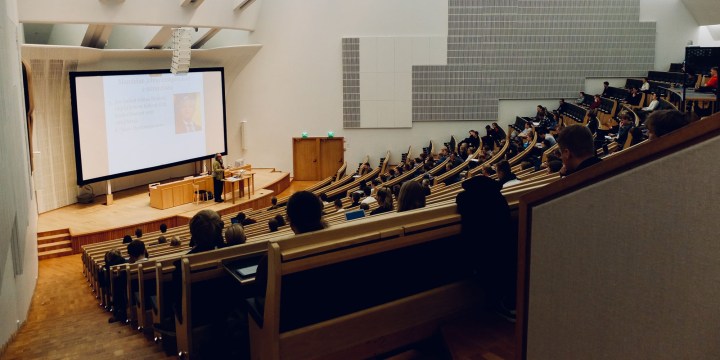EDUCATION OP-ED
Making the leap from high school to university can be stressful — we must treat our new students as valued clients

Many new students have to leave home without the requisite resources as they embark on a new journey in their lives. The vast majority arrive at universities on their own, with meagre belongings and unsure of places of residence. For some, campus becomes a real-life labyrinth, a place full of intricate passageways and blind alleys.
As the new academic year begins, universities have to address the usual critical matters that demand attention if they are to have a successful academic year. Most of these matters include the admission and registration of students who recently achieved outstanding pass rates in matric.
But it is more than just ensuring a registration process that should be as simple to navigate as possible, and backed by strong information technology. Students expect to be welcomed in friendly and enabling environments when they join the university community for the first time.
These new students are not mere “freshmen”, or “freshers”, or any other derogatory names often attached to them. They are universities’ clients — they demand excellent and flawless service from the time they set foot on the university grounds for the first time.
“The key here is, when the client is the product.” With one of her favourite catchphrases, Dr Nolitha Vukuza, a member of the University of Johannesburg’s (UJ) executive committee, reminded me and her colleagues of how a true university should treat its students.
The occasion was a meeting with the incoming UJ Chancellor, Dr Phumzile Mlambo-Ngcuka. Time and again, Dr Vukuza emphasised that a true university should treat students as its clients and, conversely, as its products.
The importance of this cannot be emphasised enough, especially in a country like ours, due to our enduring socioeconomic challenges. For many students, the beginning of the year is a stressful time. They have to leave home for new environments without the requisite resources as they embark on a new journey in their lives. There might be a few students who are fortunate to be “chauffeured” to university by their parents and with luggage packed with all manner of necessities, but the vast majority arrive on their own with meagre belongings and unsure of places of residence.
Others get lost in the cities and towns and have to brave the dreaded scourge of crime and criminality. For some, campus becomes a real-life labyrinth, a place full of intricate passageways and blind alleys.
On my walkabout at UJ recently, I had a conversation with a group of students. I asked what their first day in class was like. They were unanimous in their response: they had already taken a tour of campus to find their lecture halls. That was an important step to take because even those who have had the experience of living in boarding schools might find university life just as challenging as those who attended school while at home.
What is critical, therefore, is for universities to have a team of professionals who ensure a friendly and welcoming environment. They should offer much-needed guidance to help the students to transition from secondary school to tertiary education, regardless of their social and economic backgrounds.
This should start with proper orientation so that students may understand the university’s environment as they begin to be integrated into its culture. Such an orientation should include its physical features such as infrastructure like lecture halls, laboratories, libraries around campus and beyond, as well as academic programmes and health and wellness facilities.
We cannot underestimate how intimidating the university environment is for students, as they have different personalities and come from different backgrounds.
More often than not, there is the assumption that students starting university know what they want to study as they have applied for specific programmes. But as experience has shown, a number of them are still not sure of their plans and what specific programmes they wish to study.
Small wonder that cases of students changing their study programmes after the first year, or even midway in the year, are rife. In fact, there have been reports of students starting completely new programmes after completing their undergraduate qualification. At worst, some have dropped out.
The reality is that many schools, especially those in rural areas, do not have career guidance programmes. In many cases, their curricula are not aligned to the demands of the modern job market. As such, students only discover later in their studies that what they registered for is incompatible with their talents and preferred careers. These are matters that should not be taken for granted, whether the orientation programme happens online or through a face-to-face mode, if students are to be considered as clients in the truest sense of the word.
Sadly, most programmes are likely to be full and not able to accommodate students wanting to change their courses by the time they discover where their interests lie. Matters like career guidance must be taken seriously, starting at the school level.
The government, through the Department of Basic Education and the Department of Higher Education, should foster strategic partnerships with universities and the private sector to offer career guidance at the secondary school level, at least. The value of such programmes might not seem tangible at the initial stage, but their long-lasting benefits will be immeasurable when they go to tertiary institutions.
There is nothing so painful as dropping out of university — not because of poor performance, but having placed oneself in a wrong programme.
Research by the National University of Caaguazú, Paraguay — titled Mind the gap between high school and university! — found: “In the phase of entrance into the new university environment, the student may be more vulnerable and exposed to critical experiences. The transfer determines, indeed, a change from the state of dependent to independent learner, from studying in a carefully monitored environment with a highly regulated timetable to a new phase of life where learners manage their time and make decisions in a more responsible adult way.”
The study further found that “drop-out imposes a heavy economic burden to the society, in terms of resources used, costs incurred, and the amount of individual and collective investments in human capital that turn out to be an unproductive loss.”
This is about the future that might be at stake and, as a nation, we have to step up and guide these students.
Another matter of grave concern at universities is the health, safety and security of the students. The best service we can offer to our new and existing clients at universities is an environment that promotes their wellbeing in terms of health standards such as cleanliness, diet and interaction with others.
All students deserve a safe and secure living and learning environment, free of any risk related to physical and emotional harm. That safety and wellbeing must include the scourge of gender-based violence that bedevils our country today. Universities must invest more resources to create safer and healthier living spaces for everyone on campuses.
The reality is that when students interact during lessons and other activities, what they eat, how they eat and where they eat is paramount. While I do not profess to be paternalistic, it is imperative that we don’t further expose and condemn those vulnerable to a difficult life of hunger and despair.
And how about exercise and gym facilities in open spaces? It’s all about a “sound mind in a sound body”, as the Greek philosopher, Thales, aptly put it.
As a client, the student would like to have the best learning experience with minimum disruption and impediments. This can only be achieved if there is good service from the university leadership, starting with council, senate, executives, administrative and support staff, as well as academic staff. Good service means dedication to professionalism, a strong work ethic and rigour in delivery.
As a product, the student looks forward to the day when they will strut across the stage of those auditoriums, revelling at hearing their name announced among the graduates in the presence of their parents. As universities go about their business of helping students, let us not forget that these are the great products that will one day be part of their alumni, who will also contribute to the university’s development in future.
As a nation, we should remember that among the myriad institutions to be preserved are universities, which are important for posterity. This is one of the roles I have enjoyed in life, serving in an academic institution like the University of Johannesburg.
Universities must be led and run professionally in the interests of the client and the product. DM
Mike Teke is the Chair of the UJ Council and CEO of Seriti Resources. He writes in his personal capacity.
[hearken id=”daily-maverick/9041″]


















Comments - Please login in order to comment.